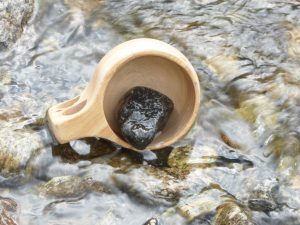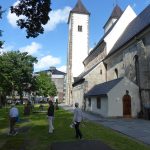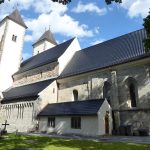This morning we had to get up early to grab a bite on the aft deck, as we wanted to explore Bergen early on before our visit to the Fantoft Stavkirke.
Before breakfast we talked with our steward a little about his work conditions. As expected and as feared, they are depressing from our European point of view. We did not discuss his income, but holidays, leisure time, working hours, and family. They work for seven month every day more or less around the clock with one real free hour and time to sleep. Then they have two months off without pay. To get home to the Philippines, Russia, Indonesia and other countries they have to pay for that trip themselves. Our steward was doing this now for over 10 years. This implies that he can see his family and have a family only for a short time on his bill. If you compare this to our contracts from Europe and our living standard, we are way above them in terms of income, benefits, paid vacation, healthcare etc. just because we are born in a wealthy country. This is definitely unfair.
The whole class difference becomes even more apparent through social conventions on board. Except of the officers, the crew and the travel agency employees are addressed by first name, while we, the guests, and the officers are addressed by last name and full name. While this pattern is also visible in Germany onshore in restaurants, we usually address them either formal or both sides use the informal form.
Furthermore, while we lay around like wobbly walruses in the sun and moan the heat and that we have to eat all the food, the other inhabitants of the ship have to work all day, get what is left and have to eat out of site.
This all sounds rather dark and it does not fit in the overall lovely and joyful theme of a cruise trip. However, it is part of such cruise and it shows very clearly the global social divide. This becomes even more apparent when you talk with them and they see this more as an opportunity than a burden. This also implies that the conditions at home are even worse. We should, no, we must consider that and keep in mind that our privileges are merely there by chance and inheritance, and not result of our hard work. Thankfully, the guests on our boat try to treat the staff with dignity and respect. Unfortunately, this is not necessarily the case on other cruise ships, as we have witnessed while docked in ports.
After these considerations, lets talk about Bergen. We arrived early in the morning and docked at cruise ship pier just about 1000 m from downtown Bergen. We went onshore around 10 am and had a short trip into town by foot. We visited the old Bryggen houses. B bought a cup. This is very early on in our journey. Therefore, I speculate that there will be another cup purchase by the end of the trip. It is a lovely wooden cup.
Before shopping, we visited Mariakirken (Mary’s Chruch). However, due to an ongoing service, we examined the place only from the outside. It comprises Romanesque and Gothic style elements and was build from 1130 to 1183. Even though it looks partly artificially new due to a recent renovation.
Later we visited the fish market, which is nowadays merely a tourist location where you can by fish, reindeer and whale meat and sausages. Please keep in mind that buying whale meat is an atrocity and it is illegal to import the stuff to Germany.
Later the day, we took a tour around town. We learned that, like many Norwegian towns, Bergen burned multiple times. Thankfully, the old Bryggen part originating back to Hanse times survived. They traded fish from the Lofoten with other Hanse towns. The Bryggen building were used as storage and later replaced by newer buildings further down in the harbor which allows to unload the ships directly to the storage facilities, whereas the old building required to unload the good to the pier and then transport to the storage buildings. Still the Bryggen buildings are a wonderful sight. They are skew-whiff in all possible and impossible directions. They are continuously renovated and part of the local heritage.



